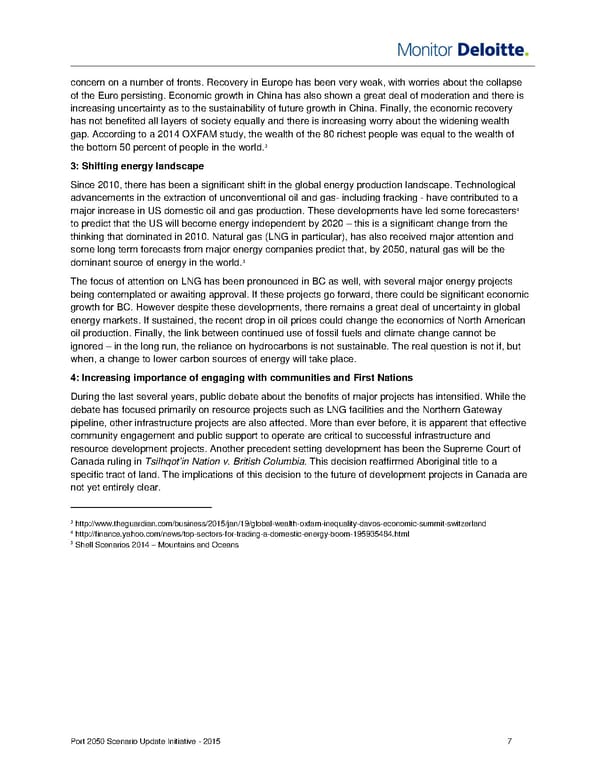concern on a number of fronts. Recovery in Europe has been very weak, with worries about the collapse of the Euro persisting. Economic growth in China has also shown a great deal of moderation and there is increasing uncertainty as to the sustainability of future growth in China. Finally, the economic recovery has not benefited all layers of society equally and there is increasing worry about the widening wealth gap. According to a 2014 OXFAM study, the wealth of the 80 richest people was equal to the wealth of the bottom 50 percent of people in the world.3 3: Shifting energy landscape Since 2010, there has been a significant shift in the global energy production landscape. Technological advancements in the extraction of unconventional oil and gas- including fracking - have contributed to a 4 major increase in US domestic oil and gas production. These developments have led some forecasters to predict that the US will become energy independent by 2020 – this is a significant change from the thinking that dominated in 2010. Natural gas (LNG in particular), has also received major attention and some long term forecasts from major energy companies predict that, by 2050, natural gas will be the dominant source of energy in the world.5 The focus of attention on LNG has been pronounced in BC as well, with several major energy projects being contemplated or awaiting approval. If these projects go forward, there could be significant economic growth for BC. However despite these developments, there remains a great deal of uncertainty in global energy markets. If sustained, the recent drop in oil prices could change the economics of North American oil production. Finally, the link between continued use of fossil fuels and climate change cannot be ignored – in the long run, the reliance on hydrocarbons is not sustainable. The real question is not if, but when, a change to lower carbon sources of energy will take place. 4: Increasing importance of engaging with communities and First Nations During the last several years, public debate about the benefits of major projects has intensified. While the debate has focused primarily on resource projects such as LNG facilities and the Northern Gateway pipeline, other infrastructure projects are also affected. More than ever before, it is apparent that effective community engagement and public support to operate are critical to successful infrastructure and resource development projects. Another precedent setting development has been the Supreme Court of Canada ruling in Tsilhqot’in Nation v. British Columbia. This decision reaffirmed Aboriginal title to a specific tract of land. The implications of this decision to the future of development projects in Canada are not yet entirely clear. 3 http://www.theguardian.com/business/2015/jan/19/global-wealth-oxfam-inequality-davos-economic-summit-switzerland 4 http://finance.yahoo.com/news/top-sectors-for-trading-a-domestic-energy-boom-195935484.html 5 Shell Scenarios 2014 – Mountains and Oceans Port 2050 Scenario Update Initiative - 2015 7
 Monitor Deloitte - Final Report Page 8 Page 10
Monitor Deloitte - Final Report Page 8 Page 10